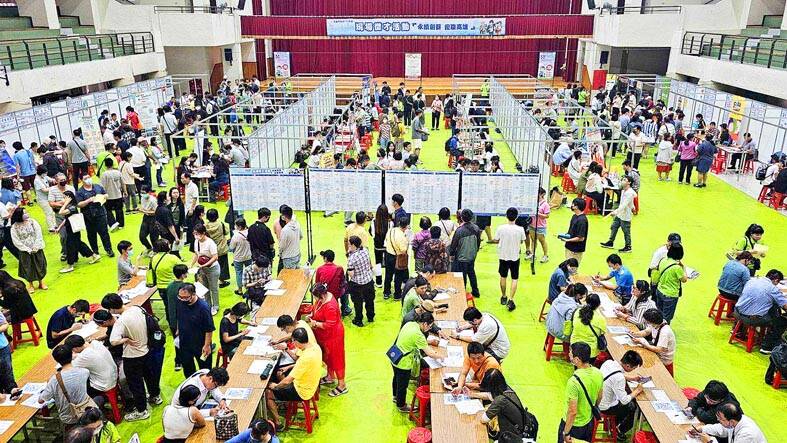The nation’s unemployment rate last month edged up to 3.45 percent, rising 0.06 percentage points from one month earlier to the highest in 10 months, owing to increases in the number of first-time jobseekers and people who quit, the Directorate-General of Budget, Accounting and Statistics (DGBAS) said yesterday.
However, the latest jobless data represented the lowest in 24 years for the month of July, suggesting a stable market, Census Department official Chang Yi-sui (張一穗) said.
The unemployment figures after seasonal adjustment held steady at 3.34 percent compared with one month earlier, Chang said, painting the uptick as seasonal.

Photo courtesy of the Kaohsiung Bureau of Labor Affairs.
It is common for the jobless gauge to grow 0.004 to 0.09 percentage points between June and August due to an influx of new graduates seeking work, he said.
Altogether, the number of unemployed people rose by 9,000, or 2.13 percent, to 415,000 after the number of first-time jobseekers increased by 5,000 and the number of people who quit picked up by 4,000, the DGBAS said.
At the same time, the number of people who worked for fewer than 35 hours a week increased by 14,000, the agency’s report said.
The average period of unemployment stood at 20.2 weeks, dropping by 0.6 weeks from one month earlier, the DGBAS said.
The duration was shorter for first-time jobseekers at 15.8 weeks and extended to 21.4 weeks for other groups, it said.
By educational attainment, people with a university degree had the highest unemployment rate at 4.67 percent, followed by high-school graduates at 3.26 percent, people with junior college diplomas at 2.74 percent and people with a graduate degree at 2.64 percent, the agency found.
People with junior-high school or lower education had the lowest unemployment rate at 2.09 percent, it said.
Meanwhile, people aged 20 to 24 had the highest unemployment rate at 12.13 percent, followed by the 15-to-19 age bracket at 9.12 percent, and the 25-to-29 group at 5.87 percent, the agency said.
The jobless rate moderated to 3.37 percent among people aged 30 to 34, stood at 2.71 percent for those aged 35 to 39, averaged 2.51 percent for people aged 40 to 44, and at 2.16 percent for people aged 45 and 64, the DGBAS said.
The nation’s seasonally adjusted unemployment rate of 3.34 percent is higher than Hong Kong’s 3 percent, South Korea’s 2.5 percent and Japan’s 2.5 percent, the agency said.

Taiwan’s exports soared 56 percent year-on-year to an all-time high of US$64.05 billion last month, propelled by surging global demand for artificial intelligence (AI), high-performance computing and cloud service infrastructure, the Ministry of Finance said yesterday. Department of Statistics Director-General Beatrice Tsai (蔡美娜) called the figure an unexpected upside surprise, citing a wave of technology orders from overseas customers alongside the usual year-end shopping season for technology products. Growth is likely to remain strong this month, she said, projecting a 40 percent to 45 percent expansion on an annual basis. The outperformance could prompt the Directorate-General of Budget, Accounting and

Two Chinese chipmakers are attracting strong retail investor demand, buoyed by industry peer Moore Threads Technology Co’s (摩爾線程) stellar debut. The retail portion of MetaX Integrated Circuits (Shanghai) Co’s (上海沐曦) upcoming initial public offering (IPO) was 2,986 times oversubscribed on Friday, according to a filing. Meanwhile, Beijing Onmicro Electronics Co (北京昂瑞微), which makes radio frequency chips, was 2,899 times oversubscribed on Friday, its filing showed. The bids coincided with Moore Threads’ trading debut, which surged 425 percent on Friday after raising 8 billion yuan (US$1.13 billion) on bets that the company could emerge as a viable local competitor to Nvidia

BARRIERS: Gudeng’s chairman said it was unlikely that the US could replicate Taiwan’s science parks in Arizona, given its strict immigration policies and cultural differences Gudeng Precision Industrial Co (家登), which supplies wafer pods to the world’s major semiconductor firms, yesterday said it is in no rush to set up production in the US due to high costs. The company supplies its customers through a warehouse in Arizona jointly operated by TSS Holdings Ltd (德鑫控股), a joint holding of Gudeng and 17 Taiwanese firms in the semiconductor supply chain, including specialty plastic compounds producer Nytex Composites Co (耐特) and automated material handling system supplier Symtek Automation Asia Co (迅得). While the company has long been exploring the feasibility of setting up production in the US to address

OPTION: Uber said it could provide higher pay for batch trips, if incentives for batching is not removed entirely, as the latter would force it to pass on the costs to consumers Uber Technologies Inc yesterday warned that proposed restrictions on batching orders and minimum wages could prompt a NT$20 delivery fee increase in Taiwan, as lower efficiency would drive up costs. Uber CEO Dara Khosrowshahi made the remarks yesterday during his visit to Taiwan. He is on a multileg trip to the region, which includes stops in South Korea and Japan. His visit coincided the release last month of the Ministry of Labor’s draft bill on the delivery sector, which aims to safeguard delivery workers’ rights and improve their welfare. The ministry set the minimum pay for local food delivery drivers at